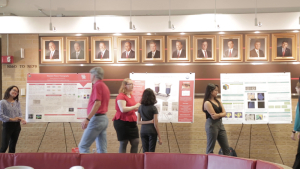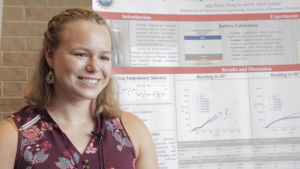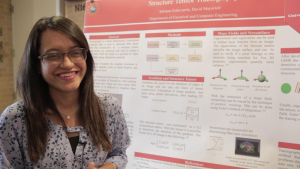UH Cullen College’s REU Programs Focus on Materials Science, Neurotechnologies
For 10 weeks over the summer, undergraduate students from across the U.S. became bonafide engineering researchers, working alongside some of UH Cullen College’s brightest minds to solve some of the world’s most pressing technical challenges with science and ingenuity.
The National Science Foundation designated the University of Houston as a Research Experience for Undergraduates (REU) site and awarded UH researchers $790,000 for three years to reach students early in their college careers.
Twenty six students were chosen for the 2018 competitive research opportunity. They traveled in from far-flung places, including the Midwest, Rhode Island and Puerto Rico, to participate in one of two REU groups: Materials for Sustainability in Energy and Manufacturing as well as Neurotechnologies to Help the Body Move, Heal and Feel Again.
The UH engineers leading the program – Haleh Ardebili, Bill D. Cook Associate Professor of mechanical engineering, Jacinta C. Conrad, Frank M. Tiller Associate Professor of chemical and biomolecular engineering, Jose Luis Contreras-Vidal, Hugh Roy and Lillie Cranz Cullen Distinguished Professor of electrical and computer engineering, and Stuart Long, professor of electrical and computer engineering and associate dean of the Honors College and Undergraduate Research – share a motivation for leading students into the future.
“Nationwide there is a critical objective to increase the number of students pursuing careers in the STEM fields,” said Ardebili. She thinks the REU program will inspire students to continue in the science, technology, engineering and mathematics (STEM) fields.
“A large body of research shows we lose students at all stages in the pipeline,” said Conrad. “Typically students need role models and research experience early.”
The REU students are getting plenty of both in the program, each working under a UH engineering professor and graduate student mentor as they conduct their daily research.
Inspired, motivated undergraduates
The students chose to spend a good portion of their summer learning hard and working in labs for a myriad of reasons.
Julia White, a materials engineering junior at Purdue University, wanted to spend the summer doing research and traveling.
“A huge benefit of these REUs is that you’re getting paid to learn and get good experience, and you’re able to explore a new city,” said White, a first-time visitor to Texas. “It’s a fantastic opportunity.”
She was excited to be part of the REU focusing on sustainable materials – particularly the opportunity to work with Ardebili, who is well-known for her research on creating flexible, stretchable and bendable batteries and electronics.
“I’m very passionate about the environment and I think the way I can most make a difference is by getting into battery development because batteries are what’s holding us back,” White said. “If we can make batteries last longer and find better ways to store energy for future use, then we can really get renewable energy on the map, have it be a viable option.”
For Adriana Echevarria, an undergraduate student majoring in mechanical engineering at the University of Puerto Rico, inspiration came from Hurricane Maria.
In September 2017 Hurricane Maria ravaged Puerto Rico destroying lives, obliterating homes, businesses and infrastructure. Even after the winds and rain stopped, the devastation continued. People faced food and water shortages, lack of medical resources, power outages and financial issues. An estimated 2,975 people died as a result of the storm.
A year later, many businesses are still shuttered and blue tarps continue to serve as temporary roofs.
“Many remote areas still don’t have electricity and that’s since Hurricane Irma, which came before Maria. But I think the greatest damage that was caused was psychological and emotional,” said Echevarria, who considers herself one of the lucky ones. During Maria’s onslaught she was with her family and, while water did get into their house, they all survived the experience safe and sound.
Echevarria traveled for the first time out of Puerto Rico to participate in the Neurotechnologies to Help the Body Move, Heal and Feel Again group.
“For me, the brain is the most interesting part of the body, that’s where everything happens,” she said. “Being here, learning new skills will help me understand what I can take back to Puerto Rico to help my university and my people.”
Starting out in a new lab means preparing for the work. White spent most of the first week on background readings and lab training. And it paid off. She soon found herself working in Ardebili’s lab every day and making progress.
“I just think it’s very cool that I was able to take all these raw materials and put them together to make working batteries. I didn’t think I was going to be able to do that so quickly,” White said. “Also, I had awesome mentors and learned a lot – even more than I expected.”
Her UH REU experience reaffirmed her love for problem-solving and research.
“Research is a great way to problem-solve in a way that can really make a difference in society and the world,” said White. She hopes to earn a Ph.D. and do research in industry or at a national lab in the future.
Echevarria spent this summer working with David Mayerich, assistant professor of electrical and computer engineering. They used tractography, a 3-D modeling technique in neuroscience, to develop algorithms and more detailed visual representation of data collected from the brain.
“The 3-D representation is a tool that’ll help scientists and doctors get a clearer understanding of the data,” she said.
The mass destruction in Puerto Rico led to cancelled classes and extended semesters, which resulted in Echevarria taking some finals while working in Mayerich’s lab.
Lasting impacts
At the end of the 10 weeks at UH, Echevarria, White and their REU cohorts participated in the 2018 REU Poster Session and presented their research to students and faculty.
“If I didn’t do this, I would be regretting it so much because it was an amazing experience,” Echevarria shared. She said the experience helped her achieve her goals: to get hands-on research experience, gain a better understanding of bioengineering and develop herself as a student and professional.
“I like to think I’m representing Puerto Rico,” Echevarria said. “That despite everything that happened, we’re still here, we’re still willing to work, we’re still willing to improve the life of other people as engineers and professionals, as individuals.”
Contreras-Vidal, who also serves as director of the NSF IUCRC BRAIN Center at the University of Houston, said the REU program offers a unique opportunity for students to learn firsthand about how technology impacts society and people.
“At the end [of the experience], students will not only know more about the field, but know how to communicate, how to find information and, most importantly, understand the role of an engineer in society,” he said.
To learn more about the Cullen College REU program, view this video: https://youtu.be/oEKn6i2Topc


